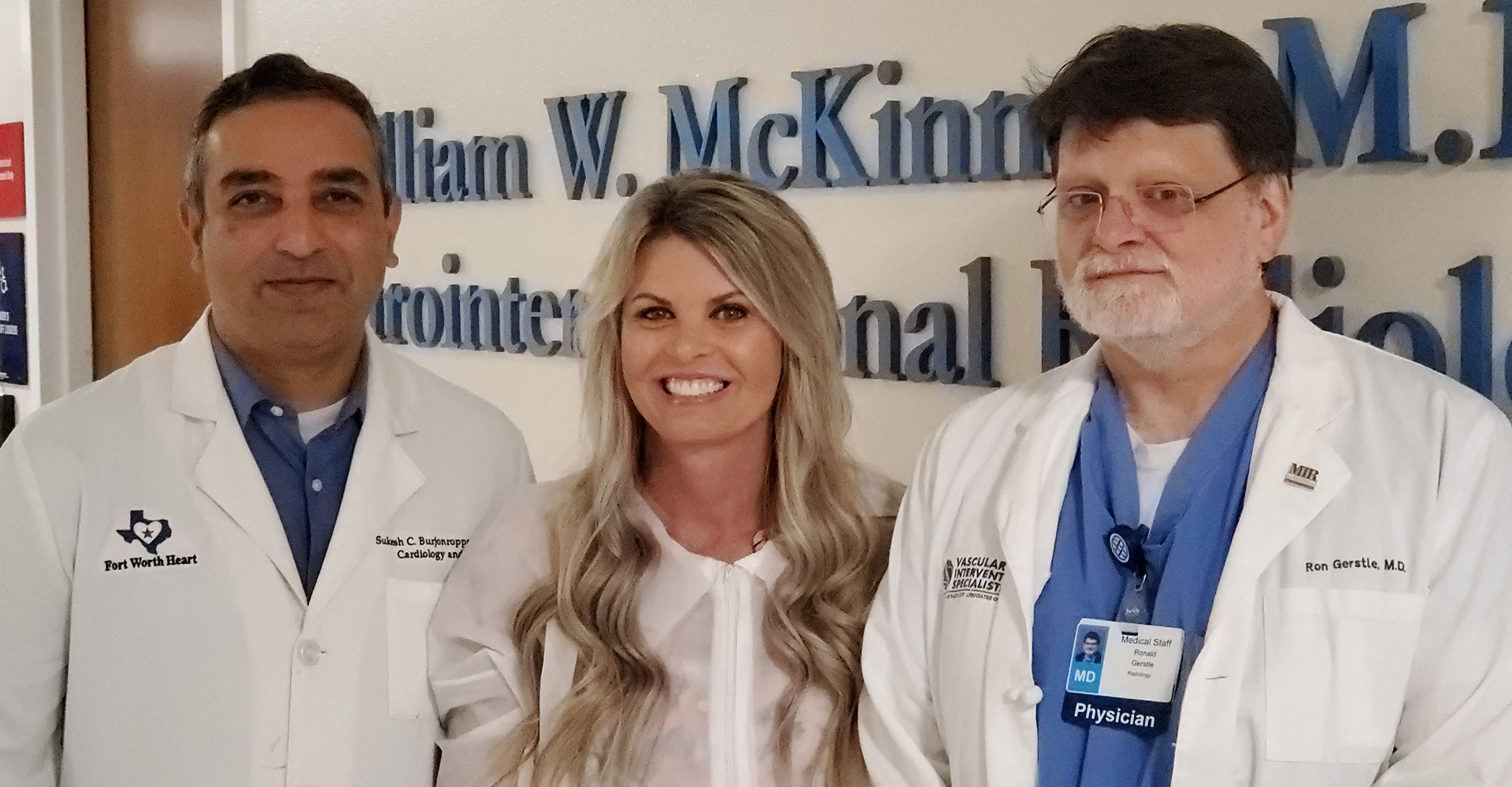FORT WORTH, Texas — Amanda Douglas couldn’t pinpoint the reason for her extreme fatigue or the burning feeling in her head after falling asleep during a family outing. Later that evening, she felt a popping sensation on the right side of her head. Immediately, her left side went limp and her head hit a kitchen cabinet as she fell to the floor.

Sukesh Burjonroppa, M.D. (left), Amanda Douglas, and Ronald Gerstle, M.D.
The young mother of four spent more than two weeks at Texas Health Harris Methodist Hospital Fort Worth, where she had intricate procedures on her brain and heart and nearly lost her life.
Through her will to survive, she is now an advocate for stroke awareness.
“While I was at Texas Health Fort Worth, I earned the nickname ‘Little Miracle,’” Douglas said. “A large portion of my brain was deprived of oxygen and blood flow for more than five hours, but the only deficit I’m dealing with is slight weakness on my left side, which is amazing.”
Receiving care at an Advanced Comprehensive Stroke Center
At the age of 38, Douglas had suffered a stroke.
After her son called 911, paramedics drove Douglas to Texas Health Fort Worth, one of fewer than 50 comprehensive stroke facilities in the state. It’s also the only Comprehensive Stroke Center in Tarrant County with advanced certification from The Joint Commission. The designation encompasses the full spectrum of stroke care — diagnosis, education, rehabilitation and treatment.
In fact, Texas Health Fort Worth cares for the highest number of stroke patients* in North Texas.
“Acute ischemic stroke is a medical emergency, and outcomes without treatment can be catastrophic,” said Ronald Gerstle, M.D., an interventional neuroradiologist on the medical staff at Texas Health Fort Worth.
Gerstle said Douglas’ stroke was caused by a clogged right middle cerebral artery (MCA), which supplies a large amount of brain tissue and has a proportionally large blood flow. Symptoms usually involve weakness on one side of the body and facial droop.
Gerstle made a small incision in Douglas’ upper right leg, threaded a catheter and suction device through an artery and then removed the clot from her right MCA, which returned blood flow to normal.
“The quick action of Mrs. Douglas’ family and the rapidity of emergency services were key to her survival,” he said.
Receiving a congenital condition diagnosis
Douglas didn’t have any conditions typically expected to lead to ischemic stroke, such as atrial fibrillation, carotid artery stenosis, high blood pressure, smoking, diabetes or high cholesterol.
Physicians ran additional tests to determine why a healthy woman under 40 would suffer a stroke. Specialized echocardiograms soon revealed a patent foramen ovale (PFO), a small opening between the upper two chambers of the heart that doesn’t close properly after birth.
PFOs are frequently identified as the cause for stroke in younger patients. To address the congenital heart condition and prevent the possibility of future strokes, Sukesh Burjonroppa, M.D., an interventional cardiologist on the Texas Health Fort Worth medical staff, performed a PFO closure procedure.
According to the American Heart Association’s journal Stroke, the PFO size, or distance between the upper two chambers of the heart, can be categorized as small (0 to 1.9 mm), medium (2 to 3.9 mm) or large (more than 4 mm).
Burjonroppa said tests determined Douglas was in dire need of a PFO closure, as hers was measured at 10 millimeters.
Less than two months after her thrombectomy, Burjonroppa closed Douglas’ PFO. The procedure involves making a tiny incision in the groin area and using intracardiac ultrasound guidance to maneuver an expandable device that looks like two metal mushroom disks through a vein all the way to the heart.
“The body repairs itself through scar tissue, and over time, the tissue will cover the metal device,” Burjonroppa said. “The PFO closure helps eliminate blood flow being pushed between the right and left sides of the heart, which can lead to future strokes.”
Douglas credits her survival story to the care received at Texas Health Fort Worth, her strong family support system and her faith.
“My doctors remind me that I could have had so many more deficits, going that long without oxygen to my brain, but I’m alive and thriving,” said Douglas. “Before my stroke and to this day, I tell myself and others, ‘Let your faith be bigger than your fear.’”
Learn more about how Texas Health is advancing stroke care throughout North Texas.
* Source: Statistical information provided by Texas Health Care Information Collection.
Related News
About Texas Health Resources
Texas Health Resources is a faith-based, nonprofit health system that cares for more patients in North Texas than any other provider. With a service area that consists of 16 counties and more than 7 million people, the system is committed to providing quality, coordinated care through its Texas Health Physicians Group and 29 hospital locations under the banners of Texas Health Presbyterian, Texas Health Arlington Memorial, Texas Health Harris Methodist and Texas Health Huguley. Texas Health access points and services, ranging from acute-care hospitals and trauma centers to outpatient facilities and home health and preventive services, provide the full continuum of care for all stages of life. The system has more than 4,100 licensed hospital beds, 6,400 physicians with active staff privileges and more than 26,000 employees. For more information about Texas Health, call 1-877-THR-WELL, or visit www.TexasHealth.org.
